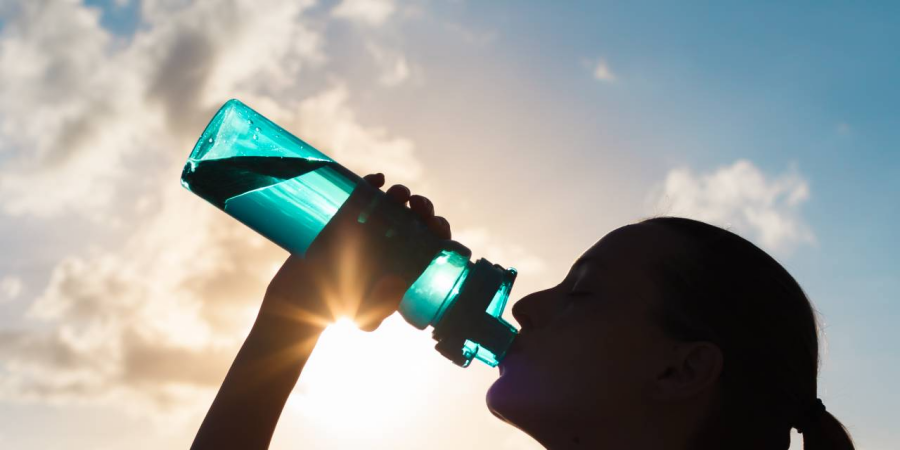

Hello friends!
You are aware that drinking water on a regular basis improves your health and is necessary for survival. But when you drink H2O, what's actually happening in your body? To put it briefly, a great deal. A surprising fact about your body weight is that, according to the U.S. Geological Survey, water makes up around 60% of it.
Water is used by your body to support several physiological processes and to assist control body temperature in all of its cells, organs, and tissues. It's critical to rehydrate your body by consuming foods and beverages that contain water because breathing, perspiration, and digestion all cause your body to lose water. RELATED: 6 Odd Dehydration Symptoms You Should Be Aware of The Mayo Clinic states that there are several elements that determine how much water you should drink.
1. Water Preserves Your Spinal Cord, Joints, and Tissues According to the Mayo Clinic Health System, water does more for you than merely relieve your thirst and control body temperature.
It also keeps your body's tissues moisturised. You know what it's like to have dry lips, nose, or eyes? According to the U.S. Geological Survey, being hydrated aids in the body's ability to maintain ideal moisture levels in these delicate tissues as well as in the blood, bones, and brain. Furthermore, water serves as a lubricant and cushion for your joints in addition to protecting your spinal cord.
2. Water Aids in the Expulsion of Waste Your body can eliminate waste through urination, faeces, and sweating when you consume enough water. The National Kidney Foundation states that drinking water keeps the blood arteries leading to your kidneys clear and aids in your kidneys' removal of waste from your blood.
Water is essential for preventing constipation as well, according to the University of Rochester Medical Centre. However, because there are a lot of variables involved, study adds that there is no proof that drinking more water will alleviate constipation.
3. The Digestion of Water Digestion needs water to be in good condition. According to the Mayo Clinic, water aids in the digestion of meals so that your body can absorb its nutrients. Water is absorbed by both your small and large intestines after drinking, entering your bloodstream and aiding in the breakdown of nutrients.
Stool turns from liquid to solid as your large intestine absorbs water, according to the National Institute for Diabetes and Digestive and Kidney Diseases. According to MedlinePlus, water is also required to aid in the digestion of soluble fibre. This fibre gels when it comes in contact with water, which slows down digestion and prolongs feelings of fullness.
4. Drinking water keeps you from being dehydrated The Centres for Disease Control and Prevention state that when you exercise vigorously, perspire in hot weather, have a fever, or get sick with an illness that causes vomiting or diarrhoea, your body loses fluids.
It's critical to up your fluid intake if you're experiencing fluid loss due to any of these conditions in order to replenish your body's normal level of hydration. In order to cure various medical disorders, such as urinary tract stones and bladder infections, your doctor could also advise you to drink more water.
5. Water Promotes Optimal Brain Function Have you ever had mental fog? Drink a little water. According to a tiny study, dehydration impairs memory, attention, and energy. The authors note that it makes sense because 75% of the brain is made of water.
A contributing factor to that feeling of confusion? Maintaining a proper electrolyte balance is essential to your body's optimal operation. Low electrolytes can lead to problems such as weariness, disorientation, and weakness of the muscles, according to New York City functional medicine doctor Gabrielle Lyon, DO.
6. Water Maintains the Health of Your Cardiovascular System A large component of your blood is water. (For example, according to Britannica, roughly 90% of plasma, the pale yellow liquid component of your blood, contains water.)
According to Susan Blum, MD, founder of the Blum Centre for Health in Rye Brook, New York, becoming dehydrated causes your blood to become more concentrated, which might result in an imbalance of the electrolyte minerals it contains (potassium and sodium, according to the Merck Manual). These electrolytes are essential for healthy heart and muscle function. Dr. Blum states that dehydration can also cause a drop in blood volume and blood pressure, which can make you feel dizzy or lightheaded upon standing up. According to a 2023 study, staying properly hydrated may even slow down the ageing process.
7. Drinking Water Can Make You Eat Better Despite being simple, it has great power. One study, which involved over 18,300 adult Americans, found that those who increased their daily water intake by just 1 percent reduced their calorie intake as well as their intake of saturated fat, sugar, sodium, and cholesterol. A tiny study with 15 young, healthy volunteers supported the idea that drinking water before a meal can help you feel fuller.
